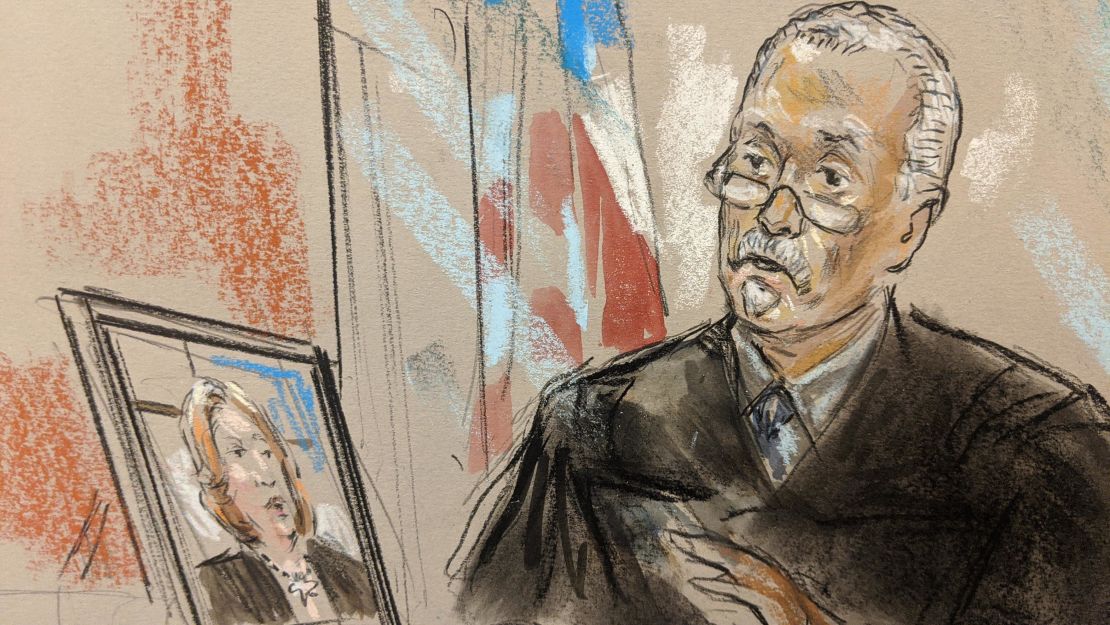A lawyer for former national security adviser Michael Flynn acknowledged at a court hearing on Tuesday that she recently spoke with President Donald Trump about the politically charged case.
The lawyer, Sidney Powell, said she recently discussed the Flynn case with the President and with a Trump campaign lawyer. Powell said she asked Trump not to pardon Flynn.
“I spoke with Jenna Ellis and with the President himself to provide a brief update on the status of the litigation within the last couple of weeks,” Powell said.
The conversation was “in-person,” Powell said.
Powell revealed the conversations during intense questioning by Judge Emmet Sullivan, who is overseeing the case and weighing whether to grant the Justice Department’s request to drop the criminal charge against Flynn for lying to the FBI about conversations with Russia during the presidential transition. Powell initially refused to answer the question, citing executive privilege, before acknowledging her conversation with Trump.
“I’ve had a number of discussions with the President of the United States,” she said.
She denied that she asked Trump to order Attorney General William Barr to help her client though she acknowledged that she requested that the President not issue a pardon for Flynn.
The case has been plagued by allegations of politicization. A court-appointed lawyer argued that the Justice Department decided to drop the case because Flynn is a political ally and friend of Trump.
Sullivan has made clear he might consider sentencing Flynn for his lies, which he pleaded guilty to under oath almost three years ago. A third-party lawyer, former federal judge John Gleeson, will be in court as well to argue the legal path Sullivan could take to keep the case alive and sentence Flynn.
5-hour hearing
A five-hour court hearing over whether Flynn could be sentenced or exonerated for lying to the FBI ended with no ruling from the judge on Tuesday. Instead, the proceeding became an airing of grievances over the case and the Russia investigation, with Flynn’s attorneys running through a host of right-wing theories about the Obama administration and the Justice Department openly accusing the FBI of setting Flynn up in 2017.
It was a stunning turn for a department that for more than two years stood by Flynn’s criminal charge and the cases against Russians for election interference and other former top Trump advisers who obstructed the Russia investigations.
“What if it was true?” Hashim Mooppann of the Justice Department said. “Let’s say the President is right and it is a witch hunt.”
Another lawyer for the Justice Department, longtime national security prosecutor Kenneth Kohl, argued that the FBI agents involved in the Flynn case had made so many professional mistakes, they couldn’t be used to prove the case against Flynn at a trial. Kohl said the FBI officials on the case were examples of “lying under oath, misleading the court, acting with political motivation,” citing internal investigative findings. Prosecutors have both transcripts of Flynn’s calls with the then-Russian ambassador Sergey Kislyak in late 2016 and the FBI memo detailing how Flynn denied parts of the conversations during a West Wing in early 2017.
A former federal judge appointed to argue against the Justice Department – since it had aligned with Flynn earlier this year – implored Sullivan to look at the facts of Russian attempts to interfere with the 2016 election and serious concerns the national security community had about Flynn when he lied.
The third-party lawyer, Gleeson, also told Sullivan the courts had their own constitutional authority to act separately from other branches of government and as a check on executive branch corruption.
“You’re not required to act like you were born yesterday,” Gleeson said.
Sullivan had planned to sentence Flynn for the lying charge in late 2018 before allowing him more time to cooperate with prosecutors in another case – which he backed out of, the judge noted. Sullivan indicated on Tuesday he is interested in more explanations and facts on what has happened in the case.

Mooppann argued that Trump’s statements about Flynn and his suspicions of the Russia investigation, shared often on Twitter, don’t prove the administration is dropping the case out of favoritism for an ally of the President.
He noted Trump in recent months hadn’t directed the attorney general to dismiss the case against Flynn. (However, dismissing the Flynn investigation has been a push of Trump’s for years now. Trump asked, in the first days of his administration, then-FBI Director James Comey to let Flynn go, for instance.)
Flynn’s attorney, Powell, called the investigation into Flynn “part of the coup to take out Trump” and told the judge that even allowing the case to proceed with a hearing was “a hideous abuse of power.”
This story has been updated with details from the hearing.



